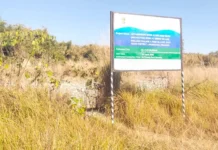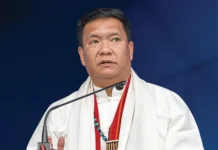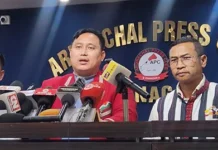[ Dekio Gumja ]
There are many instances of sudden law and order problems in the Itanagar Capital Region (ICR) leading to loss of public property worth crores of rupees, as well as loss of life.
The PRC issue, the APPSC scam, and dozens of bandh calls paralysed the beautiful capital city of Arunachal. Such frequent law and order issues have several ill-effects on the state, which can’t be described in a single page. Besides other ill-effects, it hampers the growth of the city and paints a gloomy picture of our beautiful land.
What follows are a few observations based on my work experience as a police officer the simple terms.
Why do organisations and unions frequently enforce bandh calls while raising issues of public importance? The main reasons are:
- Historical factors: Bandh calls were used by leaders of pre-independent India against the foreign government in India, and such actions were copied by post independent Indian leaders against the ruling government, which inspired the youths of NE india. The student leaders of Arunachal have adopted the tactic of announcing a bandh call on any issues of public importance since its formation. Even granting of statehood was opposed by the AAPSU with a bandh call.
- Ignorance of law: The leaders and public in Arunachal are unaware of the current legality of bandh. They consider it as their right to protest, whereas it has been declared illegal by the Supreme Court of India in the case of Bharat kumar vs Others, 1997. The majority of the public considered the bandh call democratic and constitutional, whereas it’s not the case. Hence, ignorance of law and legal consequences instil confidence in public to participate in such bandhs, irrespective of issues.
- Govt succumbs to pressure easily: The government, being democratic in nature, succumbs to unruly mob pressure easily. It starts negotiations once a bandh call becomes violent, and resolves the issue without bothering about the precedence being set. Leaders who are responsible for damage of public property and violation of the law of land without second thought are given due respect and regard by the government to avoid confrontation. Such precedence set by the government at the top not only encourages the bandh callers but also demoralises the government authority at the ground level.
- Weak and selective response of law enforcement agency: The response of the administration and the law enforcement agency are weak and selective, rather than professional, due to several factors in case of a bandh call.
Sometimes, the authority tries to suppress the bandh and enforce law, but in so many other cases, it just remains a mute spectator. There are no coherence in action and standard precedence to follow in such law and order situations, which not only shows the weaker side but also demotivates the junior officers and personnel working on the ground. It motivates the public and leaders to go for bandh fearlessly, without respecting the law.
- Fastest and easiest way to gain popularity and attention: A bandh call gives due recognition to the leader of an organisation as it affects the whole society and the system in one go. They get publicity free of cost.
- Emotive and innocent public with anti-establishment feeling: People of Arunachal are too straight, emotive and innocent, and can be misguided by any leader or organisation on any issue. Several members of the public blindly support bandhs without knowing the real issue and remedies. They are attracted easily towards any negative side of governance as they are dependent on government services and schemes. They consider government a messiah of every problem and solution.
What are the remedies to resolve the issue of law and order maintenance in the ICR, and how does the authority handle bandhs? The answer to this lies in the above stated points. It is the responsibility of each and every person to raise their voice against wrong precedence and negative notion in our state. Following are a few administrative remedies for maintenance of law and order.
- Commissionerate system of administration in the ICR, empowering the police to handle law and order issues in a better way. It will help in prompt response and efficient dealing with any law and order situation. The confusion between executive magistrate and police officers in making right decisions will vanish. There won’t be any issue of coordination between the two separate authorities – the DC and the SP.
The quickest decision and strategy to redress any law and order issue can be taken because of single authority and responsibility on ground. There were instances in the past when law and order could have been handled in a better way if prompt decision and action had been taken.
The present system of the DC and the SP in dealing with law and order problems is obsolete for the city. It responds in a slow and slack manner in urgent cases of law and order due to differences in individual perspective, and in the working atmosphere of two different departments.
Therefore, the commissionerate system, headed by a police commissioner in the rank of IGP should be implemented in the ICR. Almost all other cities in India have the police commissionerate system, unlike Arunachal.
- Proper legal action against violators of law and person inciting violence. Precedence of proper legal course of action should be followed, so that people may learn that violence is not a solution but a problem of solution. All perpetrators of damage to public and private properties should be brought to justice, irrespective of the cause and issue they fought for. We are governed by democratic and constitutional law, and encouraging undemocratic, unconstitutional protests must be brought to an end for a better future.
- Early redress of issues and proper communication by government. Precedence of the government redressing issues only after creating law and order situation by organisations set an ugly trend. If an issue can be resolved before any violence occurs, it would be the best. Keeping issues in observation and allowing mobs to create ruckus paint weak pictures of the state government leaders. It also demoralises the police force working on the ground, as we know that persons and leaders who are successful in inciting violence get due regards from the state’s top leaders after coming to the negotiation table. Then for whom and why should the ground staff fight and make enmity with them? This general feeling results in ineffective duty.
- Better and proper communication with the public in any important/sensitive issues. There should be a proper channel of communication with the public from top to bottom of administration with proper coordination. Communication to public should be from the bottom line of the administration first, then to the higher-ups.
Proper use of social media to communicate will be helpful in bridging the gap between the public and the government.
- The authority should avoid listening to wrong suggestions and engaging middlemen in redressing any issue of law and order. The leaders in power should have ground knowledge and information about the issues and collect information intelligently from appropriate persons. Many a time, union leaders and social leaders give wrong information about the mood of the public and the way forward to resolve issues which bring catastrophic consequences.
In a democracy, the voice of the people is sacrosanct. Governments are formed every five years as per the verdict of the majority. There are no problems in raising voice through democratic means. Democratic means are those which ensure peace, tranquillity and non-violence. The democratic way of protest becomes undemocratic and unconstitutional once it turns violent. Gandhiji called for non-cooperation movement during the freedom struggle because of sudden violence in Chuari Chaura. Bandh call usually turns violent as private vehicles are damaged, the roads are blockaded, shops are forced to down shutters, and the rights of individuals are compromised.
If we support progress and development of our state, we shouldn’t support undemocratic and unconstitutional ways of protest. The government must not succumb to pressure of violent mob, but rather empower the law enforcing authority to handle the situation and bring peace. In a civilised society, every fundamental right is bound with certain restrictions and there are fundamental duties to follow. What we do today have ramifications tomorrow.
Let us dream for a better Arunachal, Hamara Arunachal. (Dekio Gumja is SDPO, Naharlagun)



